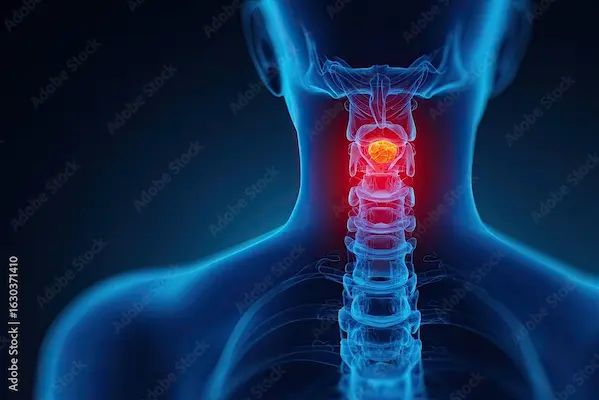Role Of TSH, T3 And T4 Levels In Hypothyroidism
Learn about the roles of TSH, T3, and T4 hormones in thyroid health. Explore their significance in diagnosing and managing hypothyroidism for better health outcomes.

Written by Dr Sonia Bhatt
Last updated on 3rd Jul, 2025
The thyroid is a butterfly-shaped gland and is a significant organ located at the front of the neck. It helps regulate functions like maintaining the metabolism and energy of the human body. Primarily, the thyroid gland serves in the secretion of two hormones: Triiodothyronine (T3) and Thyroxine (T4), produced under the influence of Thyroid Stimulating Hormone (TSH). T3, T4, and TSH work in a delicate balance, and any form of imbalance may lead to hypothyroidism.
This article focuses on the role of TSH, T3, and T4 in diagnostics and management options for hypothyroidism.
Functions of TSH, T3, and T4 in Thyroid Activity
The thyroid hormones and TSH work together to regulate metabolism and maintain hormonal balance. This is how they function:
Thyroid Stimulating Hormone (TSH)
TSH, produced by the pituitary gland, is the main signal for thyroid activity. It stimulates the production of T3 and T4 hormones. When TSH levels are low, the pituitary gland increases its production. This feedback loop is essential for maintaining hormonal balance.
Triiodothyronine (T3) and Thyroxine (T4)
There are two forms of thyroid hormones: T3 and T4. T4 is more abundant, while T3 is the active form that regulates cellular metabolism and produces energy. When T4 reaches the peripheral tissues, it is converted into T3, which then exerts metabolic effects.
Together, these hormones regulate essential functions in the body, including heart rate, body temperature, and energy metabolism.
Understanding Hypothyroidism
This condition is characterised by the inadequate production of thyroid hormones. There are mainly two types of hypothyroidism:
- Primary Hypothyroidism: This condition develops directly from dysfunction of the thyroid gland.
- Secondary Hypothyroidism: This condition results from pituitary or hypothalamic dysfunction.
Common Causes of Hypothyroidism
- Autoimmune Diseases: Hashimoto's thyroiditis is the most common cause, involving the immune system attacking the thyroid gland.
- Iodine Deficiency: This is a necessary component for thyroid hormone production, and its deficiency remains a global health problem.
- Surgical Treatments: Total or partial removal of the thyroid or radiation treatment can impair its ability to produce sufficient hormones.
- Drugs: Certain drugs like lithium and amiodarone can affect thyroid function.
Rare Causes of Hypothyroidism
- Congenital Hypothyroidism: This condition occurs through genetic predisposition or results from anomalies in the developmental process at birth, leading to insufficient hormone production and hypothyroidism.
- Environmental Causes: Toxic chemicals or over-accumulation of iodine can impede the healthy functioning of the thyroid gland, leading to hypothyroidism.
TSH, T3, and T4 Diagnosis for Hypothyroidism
To accurately diagnose thyroid disorders such as hypothyroidism, it is essential to assess the levels of TSH, T3, and T4. Below is an overview of how these hormone levels help in diagnosing and understanding the condition.
High TSH Levels
In primary hypothyroidism, low levels of T3 and T4 cause the pituitary gland to release more TSH. A hypersecretion of TSH is often the first measurable abnormality and can be a marker of the disease.
Levels of T3 and T4
The total and free level of T4 is estimated to reflect the availability of thyroid hormones.
T3 levels are often normal at the onset of hypothyroidism but generally diminish when the disease has reached an advanced stage.
Get Your Thyroid LEvels Checked
The TSH-T4 Relationship
The interaction between TSH and T4 is relevant for the proper diagnosis of thyroid disorders. Here's what the levels of these hormones indicate:
- High TSH and Low T4: Suggest primary hypothyroidism.
- Low TSH and Low T4: Suggest secondary hypothyroidism, which is mainly associated with pituitary dysfunction.
Advanced Diagnostic Tools
- Reverse T3 (rT3): This measures the quantity of inactive thyroid hormone.
- Thyroid Antibody Tests: These tests help diagnose autoimmune causes such as Hashimoto's thyroiditis.
Symptoms of Hypothyroidism
Early detection of the symptoms of hypothyroidism is helpful in proper diagnosis and treatment. The symptoms are categorised below:
Physical Symptoms
- Chronic fatigue and sleepiness
- Unaccountable weight gain which is quite noticeable
- Sensitivity to cold
- Dryness of skin and brittle hair
Constipation and muscle weakness
- Cognitive and Emotional Symptoms
- Loss of memory
- Difficulty concentrating
- Brain fog
- Depression and mood swing
Symptoms in Specific Populations
- In Children: Growth retardation or delayed puberty may be seen.
- Pregnant Women: May be more likely to have complications, such as preeclampsia and preterm delivery.
Consult Top Doctors For Thyroid Symptoms
Management of TSH, T3, and T4 in Hypothyroidism
The management of hypothyroidism depends on the individual patient's condition and involves the therapies below:
Thyroid Hormone Replacement Therapy
Hypothyroidism is treated with levothyroxine, a synthetic T4 hormone, which helps restore normal thyroid function and alleviate symptoms.
- Dosage: This depends on the TSH level, age, weight, and general state of health.
- Monitoring: It involves routine testing so that appropriate dosages may be prescribed.
Combination Therapy
Some patients, especially those who do not respond well to levothyroxine, may need to be treated with both T4 and T3.
Lifestyle and Dietary Modifications
- Dietary Changes: Iodine-enriched foods (such as seafood and dairy products), selenium-rich foods (like nuts and fish), and zinc-rich foods (including legumes and meat) are important for thyroid health.
- Exercise: Regular physical activity increases the metabolic rate and combats fatigue.
- Stress Management: Yoga and mindfulness help promote general hormonal health.
Addressing Coexisting Conditions
Treatment of anaemia, vitamin D deficiency or other related conditions may result in improved outcomes.
Complications of Untreated Hypothyroidism
Untreated hypothyroidism can lead to several serious complications, potentially affecting multiple aspects of health if left unmanaged.
Metabolic Disturbances
- Extreme weight gain
- Dyslipidemia, which is associated with a risk for cardiovascular disease
Cardiovascular and Neurological Effects
- Bradycardia and hypertension
- Impaired cognition, which manifests as forgetfulness and decreased mental acuity
Myxedema
It can be associated with significant symptoms of hypothyroidism like swelling, hypothermia, and altered mental status. It is a rare but potentially fatal condition that requires immediate intervention by a physician.
Monitoring and Follow-Up
TSH, T3, and T4 levels are monitored as a key part of managing hypothyroidism. Tracking the response to treatment helps prevent further complications. Additionally, post-medical therapy and regular checkups ensure an appropriate response to the treatment and symptoms of hypothyroidism.
Prevention of Hypothyroidism
Adequate iodine intake through diet or supplements is essential for thyroid health, while selenium and zinc minerals are crucial for the proper synthesis of thyroid hormones. Additionally, high-risk patients, such as those with a family history of thyroid conditions or during pregnancy, should undergo periodic evaluations for early detection and treatment.
Conclusion
The key to thyroid health lies in the balance of TSH, T3, and T4. Hypothyroidism disrupts this balance, leading to a range of physical, cognitive, and metabolic issues. Early diagnosis, effective treatment, and lifestyle changes are essential for managing hypothyroidism.
Understanding how these hormones interact empowers both the patient and healthcare provider, paving the way for better outcomes and improved quality of life.
Consult Top Endocrinologists
Consult Top Doctors For Thyroid Symptoms

Dr. Anand Ravi
General Physician
2 Years • MBBS
Bengaluru
PRESTIGE SHANTHINIKETAN - SOCIETY CLINIC, Bengaluru

Dr. Gayatri S
Endocrinologist
4 Years • Suggested Qualifictaion- MBBS, MD (Internal Medicine), DM (ENDOCRINOLOGY)
Nellore
Narayana hospital, Nellore

Dr. E Prabhakar Sastry
General Physician/ Internal Medicine Specialist
40 Years • MD(Internal Medicine)
Manikonda Jagir
Apollo Clinic, Manikonda, Manikonda Jagir
(125+ Patients)

Dr. Usha Ayyagari
Endocrinologist
25 Years • MBBS, MRCP(UK), MRCP (Edin), CCT (UK), FRCP (London)
Chennai
Apollo Sugar Clinics, OMR, Chennai
(125+ Patients)

Dr. Arunava Ghosh
General Physician/ Internal Medicine Specialist
9 Years • MBBS,MD(GENL.MED.),DM(ENDOCRINOLOGY)
Kolkata
VDC Clinic, Kolkata
Consult Top Endocrinologists

Dr. Anand Ravi
General Physician
2 Years • MBBS
Bengaluru
PRESTIGE SHANTHINIKETAN - SOCIETY CLINIC, Bengaluru

Dr. Gayatri S
Endocrinologist
4 Years • Suggested Qualifictaion- MBBS, MD (Internal Medicine), DM (ENDOCRINOLOGY)
Nellore
Narayana hospital, Nellore

Dr. E Prabhakar Sastry
General Physician/ Internal Medicine Specialist
40 Years • MD(Internal Medicine)
Manikonda Jagir
Apollo Clinic, Manikonda, Manikonda Jagir
(125+ Patients)

Dr. Usha Ayyagari
Endocrinologist
25 Years • MBBS, MRCP(UK), MRCP (Edin), CCT (UK), FRCP (London)
Chennai
Apollo Sugar Clinics, OMR, Chennai
(125+ Patients)

Dr. Arunava Ghosh
General Physician/ Internal Medicine Specialist
9 Years • MBBS,MD(GENL.MED.),DM(ENDOCRINOLOGY)
Kolkata
VDC Clinic, Kolkata




_0.webp)